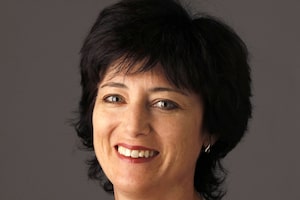Venezuela's President Hugo Chavez shows the pistols of independence hero Simon Bolivar during a ceremony to mark the his birthday in Caracas in this July 24, 2012 file photo.Carlos Garcia Rawlins/Reuters
Security was tight around the Teresa Carreno Theatre, a modernist building with columns and hexagonal roofs in the centre of Caracas. After being searched and patted down, I slipped into the hall. I was dying of curiosity – finally a chance to see El Comandante, Venezuela's controversial President, best known for his anti-U.S. tirades, up close. I was in the country to cover the 2006 election, and had interviewed political analysts, pollsters and experts trying to understand the enormous appeal, and polarizing presence, of Hugo Chavez.
Hundreds of boisterous students in red ball caps and Chavez T-shirts cheered wildly as el presidente strode onto centre stage, fashionably late. Dressed in a trademark red T-shirt over a bulletproof vest, he grinned from ear to ear as he warmed up the crowd: "He who doesn't shout is a Yanqui," his voice boomed. "Down with the oligarchs!"
A solid man of mestizo, or mixed race, background, Mr. Chavez was a riveting presence. In folksy Spanish, he sang old folk songs, quoted 19th-century history and shared anecdotes about his mentor, Cuba's Fidel Castro. More cheers. The "show" – a bizarre hybrid of political rally, religious revival meeting and rollicking folk festival – lasted 2 1/2 hours. His energy never flagged. Nor did the crowd's enthusiasm – though mine certainly did.
As entertaining as Mr. Chavez was, he was also physically imposing as he pointed his finger and gesticulated. You could sense a ruthlessness right below the surface. This was a man you would not want to make an enemy of. A man who bullied opponents and centralized power in himself. A man not afraid to publicly deride people (in his most infamous episode he lambasted former U.S. president George W. Bush at the United Nations, calling him the devil and saying the podium smelled like sulphur).
From the North American perspective, it is tempting to dismiss Mr. Chavez as a caricature, the latest in a long line of Latino caudillos, or strong men, with his sometimes incomprehensible mix of military symbolism, Marxist philosophy and admiration for revolutionary hero Simon Bolivar, as well as his determination to antagonize the United States and court such unlikely allies as Iran and Belarus. But he was a masterful political strategist, able to connect with Venezuelans in a way they felt was sincere, even as he played on their insecurities and fed their nationalist passions.
During my trip to Caracas, and on a subsequent trip in 2009, I toured several shantytowns to speak to his base: Venezuela's poorest and most marginalized. What struck me was how devoted his followers were – even as prices soared, food shortages grew worse and Caracas became one of the most dangerous places to live in Latin America. I trekked up a dusty hill to visit a shantytown on the edge of Caracas and interviewed people in their homes, held together with rotting wood and tin. They talked about their belief that Mr. Chavez would make things better, even as their urban services barely improved. The people around him might be corrupt thieves, they told me, but not Señor Chavez. Never Señor Chavez. Their faith in him was remarkable, even as some were losing enthusiasm for the Bolivarian revolution. "When it rains my ceiling falls in," Angelica Mijares, who lived at the very edge of the slum, told me. "I go to all the Chavez marches but I still can't get a better home."
 Marina Jimenez
Marina Jimenez